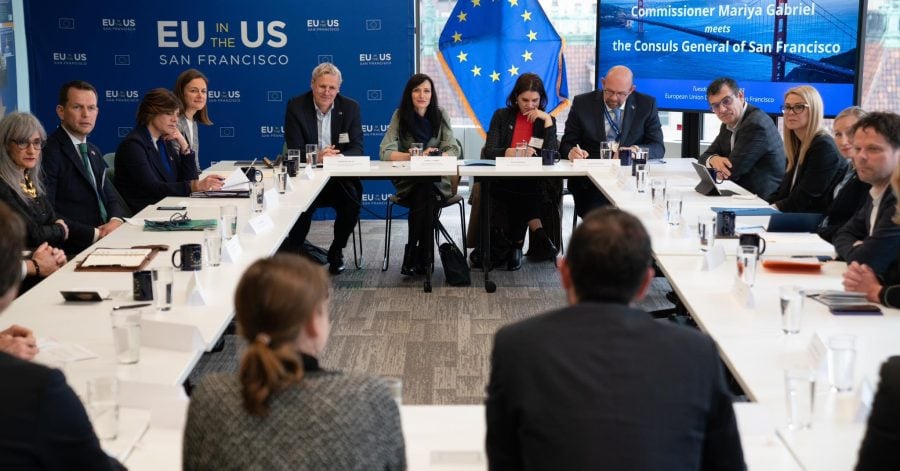What happens when you put together the birthplace of Big Tech – Silicon Valley, and Europe’s legacy of highly-educated and qualified professionals, and top-notch educational and scientific institutions?
A breeding ground for disruptive innovations. Or at least that’s what Brussels bets on as it tries to open up its fast growing tech market to attract more supporters from outside, advance its innovation ecosystems, and take Europe’s economy to the next level.
On March 22, the European Commissioner for Innovation, Research, Culture, Education and Youth – Mariya Gabriel, introduced the first-ever European Innovation Days to Silicon Valley. The idea – to showcase the diversity of the European innovation ecosystem and attract foreign investors and talent. Commissioner Gabriel was joined by a high-level delegation of over 50 EU corporates, university rectors, mayors of member-states municipalities, investors, and entrepreneurs. Together, they presented opportunities for growth under the New European Innovation Agenda.
The New European Innovation Agenda was adopted in July 2022 and it aims to position Europe at the forefront of deeptech innovation. This vision can help Europe develop and bring to the market new technologies to address its most urgent societal challenges.
The new agenda focuses on:
- funding of deep tech scale ups;
- facilitation of innovation through experimentation spaces – e.g., regulatory sandboxes, test beds, living labs,etc.;
- acceleration and strengthening of innovation in European Innovation Ecosystems (valleys) across the EU and addressing the innovation divide through cohesion;
- fostering, attraction and retention of deeptech talent in and to the EU – e.g., through an innovation intern scheme, an EU-wide talent platform to find and attract non-EU talent;
- improvement of policy-making tools and better policy coordination at EU level.
The Recursive spoke to Commissioner Gabriel about the objectives of her visit to Silicon Valley and what makes Europe attractive for foreign investment.
“We need to dare to speak more loudly about the innovation-building taking place in Europe”, Mrs Gabriel said. “Key drivers of innovation such as education and science remain and must remain on top of the upcoming agenda for growth”.
Mariya Gabriel adds that what makes Europe unique in attracting investment is the combination of talent, and scientific, educational, and industry-wide facilities. The presence of strategic investments of a significant scope and size, of EU-wide regulations for development of digital innovations, and of regional diversity adds to its strengths. All this helps Europe provide startups with opportunities for experimental testing in the vast industrial base and for innovative product marketing on a regional level.
Mrs Gabriel explains that the new Agenda aims to create at least 100 regional innovation valleys, or a community of regions, throughout Europe. “We need to create and disseminate more information on European innovation to make those regions more interconnected and strengthen Europe’s attractiveness for investment”, she added.
Commissioner Gabriel highlights that more than 1 million researchers and more than 17.5 million people in higher education reside in the EU, whilst 20% of worldwide patents, contributing to the green and digital transitions, are European. Despite turbulent times, investments in European startups for the past two years have amounted to almost €200 billion. And by 2027, the European Innovation Council, launched under the Commission’s Horizon Europe programme in 2021, has a budget of €10.1 billion to boost innovation and help European startups scale up.
As an example of the potential of regional innovation valleys, Commissioner Gabriel pointed at the dynamic development of the Bulgarian tech ecosystem in the past several years.
“If we intend for the innovations to actually build bridges and connect people in the various regions of the country, the Bulgarian ecosystem should stick together and work as an ecosystem”, Mrs Gabriel also commented on the challenges ahead.
Bulgaria has high-quality educational institutions and tech-industry champions, but they still need to find ways to compete on the global market. Different players in the Bulgarian ecosystem should work together to become highly specialized in their verticals to better position themselves to attract investment and build a global reputation.
The New European Innovation Agenda aims to bridge the diversified European ecosystems and showcase European innovation.








